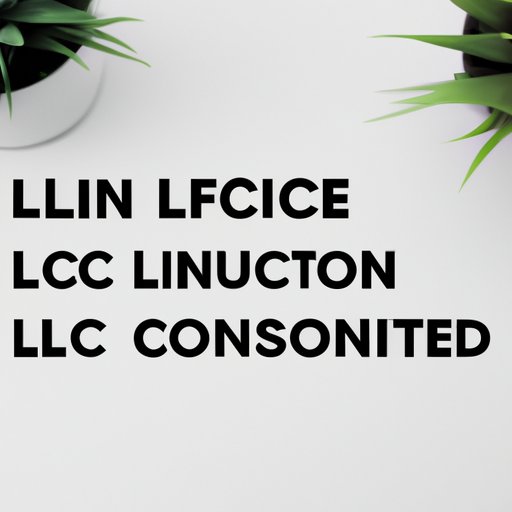
Introduction
If you’re interested in starting a business, you may have heard about forming a limited liability company (LLC). An LLC is a popular business structure in which owners enjoy limited personal liability while having flexibility in management and operations. If you’re considering setting up an LLC, this comprehensive guide will help you navigate the process.
Step-by-Step Guide
The process of forming an LLC involves several steps. First, you must choose a unique name that complies with state rules. Next, you’ll need to identify a registered agent to accept legal paperwork on your behalf. You’ll then need to file Articles of Organization or Certificate of Formation with the state and pay the required fees. Finally, you’ll need to obtain any necessary licenses and permits to operate your business.
Each step has its nuances, so it’s important to follow the rules and regulations closely. For example, some states have restrictions on what words can and cannot be used in business names. The registered agent must have a physical address in the state where the LLC is formed. Failing to complete any of these steps correctly can lead to delays and additional costs.
To help you with each step, you can consult online resources such as the Small Business Administration or seek legal advice. Additionally, some states have online portals where you can easily file paperwork and obtain licenses and permits.
Pros and Cons
Before deciding to form an LLC, it’s essential to understand the advantages and disadvantages of this business structure. One of the primary benefits of an LLC is limited personal liability, which means that the owners are not personally responsible for the business debts. This protection extends to their personal assets such as homes and cars. Along with this, LLCs enjoy flexibility in management and operations, making them easy to tailor to your specific business needs.
However, there are also disadvantages to forming an LLC. One of the most significant is higher taxes. LLC owners must pay self-employment taxes, making the tax burden higher than other business structures. LLCs also have limited fundraising options compared to corporations. Further, some states have complex rules regarding taxes and regulations that can increase the administrative burden.
Ultimately, it’s important to weigh the advantages and disadvantages against your business needs and goals. For some businesses, the benefits outweigh the costs, while for others, a different business structure may be more appropriate.
Professional Resources
If you need assistance in forming an LLC, several professional resources are available to help. Attorneys can provide legal advice and ensure that your LLC complies with all the state requirements. Online legal services offer an affordable alternative, allowing you to complete the paperwork process easily. Accountants and tax professionals can provide guidance on LLC taxes and the financial implications of forming an LLC.
Each resource has unique advantages and disadvantages. Attorneys, for example, offer more personalized services but can be more expensive. In contrast, online legal services offer affordable prices and convenience but may not provide the level of customization that some businesses require. Ultimately, it’s essential to consider your business needs and budget when selecting a resource.
Industry Focus
The process of forming an LLC can vary depending on the industry. Within real estate, for example, specific requirements and challenges arise when forming an LLC. In this industry, it’s common to have multiple LLCs to separate different activities, such as property management and development. Forming LLCs for each activity can provide additional liability protection.
For freelance writers, forming an LLC can provide tax benefits and additional liability protection. When setting up an LLC in this industry, it’s important to keep track of expenses and income. The LLC can help keep personal and business finances separate, simplifying tax filings and reducing the risk of personal liability in case of lawsuits.
Online resources such as LegalZoom or Nolo provide industry-specific insights and guidance on forming an LLC. You can also seek advice from industry professionals like real estate agents or writers’ groups.
Comparison Article
When deciding whether to form an LLC, it’s essential to consider how it compares to other business structures. Sole proprietorships, for example, offer simplicity and low starting costs but lack personal liability protection. Partnerships offer shared management and liability but can bring up issues of disputes between partners. Corporations offer extensive liability protection but can be complex in structure and operation.
In deciding on a business structure, it’s important to consider your business needs, goals, and financing options. Talking to an attorney or accountant can help you make an informed decision and ensure compliance with the state regulations.
Expert Input
Attorneys and accountants who specialize in forming LLCs can offer valuable insights and advice for businesses. They can provide tips on how to navigate the formation process, ensure compliance, and make informed decisions about ownership structure and management.
You can find expert input through online legal services, attorney and accountant directories, or industry associations. Before engaging in a professional resource, make sure to choose someone with expertise in LLC formation and experience in your industry.
Conclusion
Forming an LLC can provide several benefits for businesses, including limited personal liability and flexibility in management. However, the process can be complicated, especially in some states. By following a step-by-step guide, understanding the pros and cons, and seeking professional resources and industry-specific tips, you can form an LLC that supports your business needs and goals.
Remember to carefully consider the advantages and disadvantages of an LLC and compare it with other business structures before making a decision. If an LLC is right for you, take action and get started. Numerous resources are available to help you along the way.




